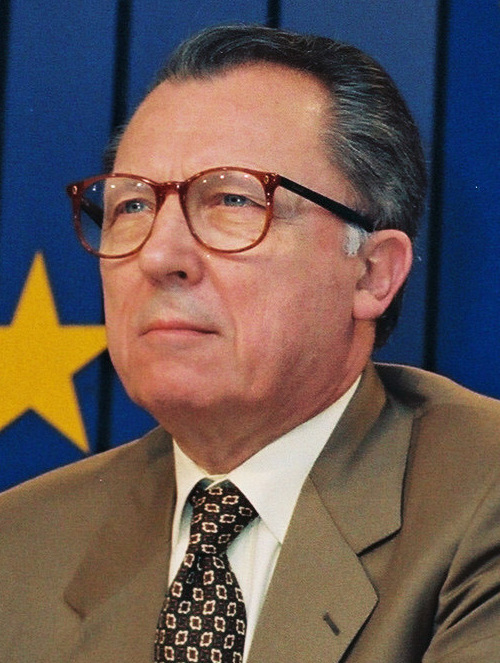
By Jacques Garello, Professor Emeritus in economics at the University of Aix-Marseille III, Founder of the annual Summer University dedicated to free market economics in Aix-en-Provence, France
The tribute paid to former EU Commission President Jacques Delors was almost unanimous. This tribute is justified when it comes to the man and his opinions, but we often forget his political actions as Minister for the Economy in 1981, and as the drafter of the Maastricht Treaty in 1992.
Jacques Delors was always faithful to his opinions. He never hid the fact: he was a social democrat. As a man of conviction, he was not a man of power. He wanted to promote his ideas, but he was not a career politician. This may seem surprising today, given the spectacle offered by today’s political class. Indeed, some commentators have imagined what France might have been like with Delors as President instead of Mitterrand in 1981.
France under the Left’s “Programme Commun”
Obviously, when you adhere to social democracy, you can only act like a social democrat. This explains the initial failure of Jacques Delors, Minister for the Economy in the French governments led by PM Pierre Mauroy from 1981 to 1983. Keynesianism teaches that growth is accelerated by stimulating private and public spending, raising the minimum wage by 10% and social benefits by 25%. In 1983, the economic growth expected as a result from these measures however failed to materialise, and the budget deficit (which had already emerged under President Giscard, since 1974) suddenly rose from 2% to 4% of GDP. Still, the major upheavals were, on the one hand, the nationalisations provided for in the Left’s Programme Commun (involving major industry, banking and finance) and, on the other, the devaluation of the French franc. Compared with its value in the European monetary system in force at the time, the Franc was devalued three times in less than a year, and the Banque de France had to sell half its foreign currency reserves to support the Franc.
The government also wanted to hire a large number of workers in the steel industry – they would later become unemployed. It regulated the working week (with the ordinance of January 1982), imposed trade union participation in management (the Auroux laws) and set a social housing ratio in each commune (the Gayssot laws). The current state of France’s Labour Code and Town Planning Code therefore owe a great deal to these “social-democratic” initiatives (endorsed by the Communist ministers in the Mauroy 2 government).
“Social Europe”
Jacques Delors left the French government to become President of the European Commission. French President Mitterrand and German Chancellor Kohl agreed to entrust him with the destiny of Europe. They knew that he was a convinced European, a progressive Catholic, and capable of organising Europe according to a project that was neither that of Jean Monnet nor that of the Treaty of Rome.
Jean Monnet was a socialist planner, he wanted to create European institutions covering all policy areas, and he was opposed to the market economy, because in his view the market meant disorder. In contrast, Adenauer, De Gasperi and Schuman, meeting in Rome with the support of the Vatican[1], dreamt of a Europe of harmony, of Union, and believed that a single market was a way of creating solidarity between peoples who had just hated each other for a century.
The originality of Jacques Delors is that he is somewhere in between. His idea was of a social Europe that would allow all peoples to share. He transposed to Europe the convictions that had driven his Parisian ministry: a social Europe, with a highly developed social charter and… a single currency. At the same time, Margaret Thatcher was beginning to campaign for an open Europe, and in her Bruges speech she expressed her hostility to any form of European integration. The Single European Act, published in 1986, enshrined her victory. It was the most liberal model possible at the time, signed by Laurent Fabius as Prime Minister but ratified by Jacques Chirac, who succeeded him as Prime Minister in 1986.
“He was more of a political technocrat in the tradition of Monet.”
Great thread on Jacques Delors. And a pleasing frontpage from the Times which perfectly sets him in a UK context. Mrs Thatcher shook his hand and smiled, but he was her foremost sparring partner (and kept giving). https://t.co/LB0iTbMoVK pic.twitter.com/ykdMTMBKwP— Adrian Hilton💎 (@Adrian_Hilton) December 28, 2023
Jacques Delors had not said his last word, and he was going to make his ideas prevail by getting an appendix added to the Single Act concerning the creation of a European currency: the euro. In a new document, the Maastricht Treaty, he laid down the principles of Social Europe and the European currency. This introduced the much-desired integration. Faced with Maastricht, the French right had a hard time defending itself. In government under Jacques Chirac (but still president under Mitterrand until 1995), the trap set by Jacques Delors was not discovered and the Right voted for a centralised, Jacobin and bureaucratic Europe, which is exactly what the European Union is today.
Jacques Delors did not hesitate to use certain provisions of the Treaty to get his ideas across. In particular – and this is important in the eyes of liberals – he provides a dubious understanding of subsidiarity. Of course he knows that this concept was introduced in the social doctrine of the Catholic Church (DSEC)[2], but according to his interpretation, subsidiarity consists of dividing the management of Europe into three levels: local, national and European. In a very French conception of decentralisation, he thereby introduces deconcentration: what matters is what is European, even if it means that Europe delegates powers to the Member States or local authorities!
The fact remains that, subject to the verdict of the people, and despite the support of the French right, the proposed Lisbon Treaty was rejected by the French, the Czechs and the Irish, when it still took the form of the “European Constitution”. In theory, after that, the proposal should have been buried, but what was rejected by referendum was in the end put to a vote by parliaments: parliamentarians from all EU member states adopted the proposal which had been rejected by the people, a form of democracy that has been all the rage in the European Union ever since.
By 2002, the euro would be introduced and the European Central Bank, guardian of the currency under ECB President Trichet, would become, under Mario Draghi and Christine Lagarde, a tool for managing national debt. Interest rates would rise and eventually inflation would be unleashed, and both European and national budgets would continue to grow, except in the few ‘frugal’ countries that have understood that a healthy economy needs well-managed finances and that a State should be limited to a regal sphere, which should represent less than 15% of GDP.
Today’s liberals are calling for a break with the Europe of Jacques Delors, and their electoral purpose is very clear: a return to the common market, institutional competition between EU Member States (according to the principle of mutual recognition of standards), the disappearance of European law and textual, compulsory and bureaucratic inflation, and an end to policies financed from the European budget – such as the very costly and ineffective energy transition. Respect for individual rights, privacy and free transactions are thereby a priority.
Originally published in French on the website of French think tank IREF












